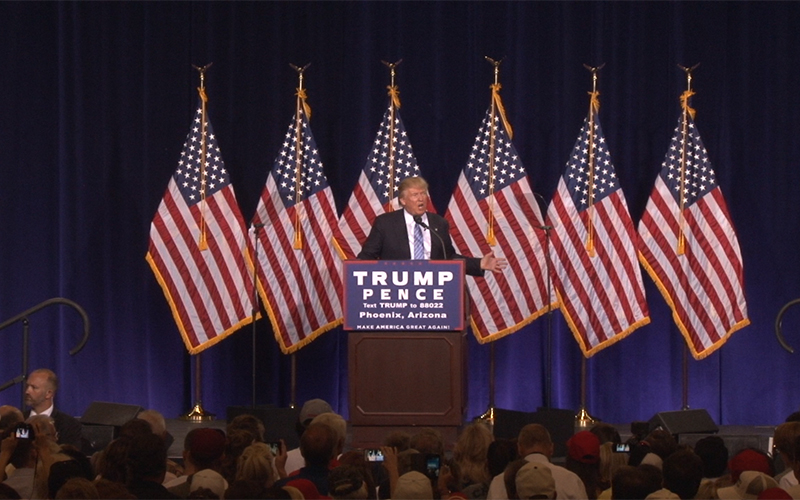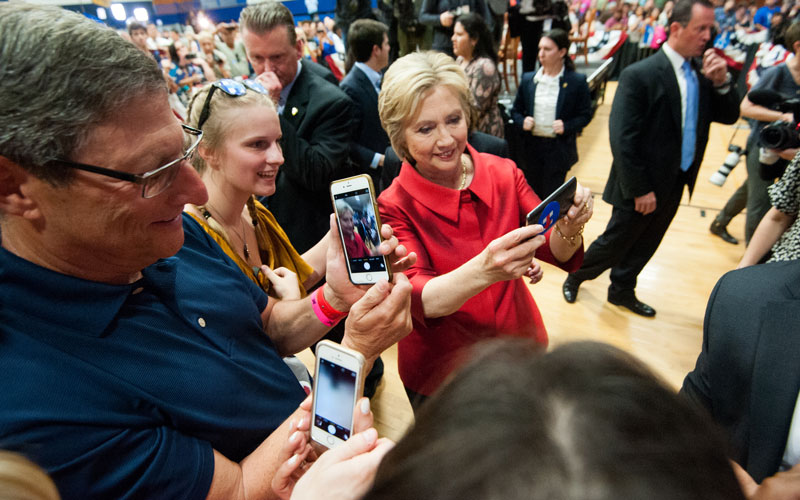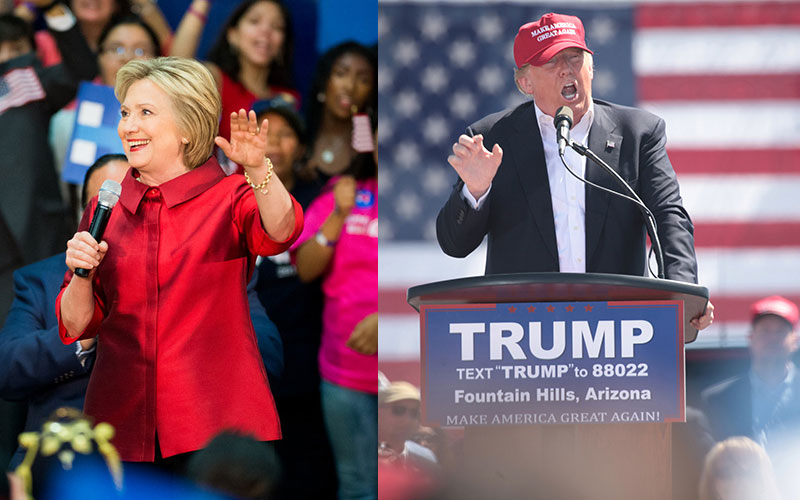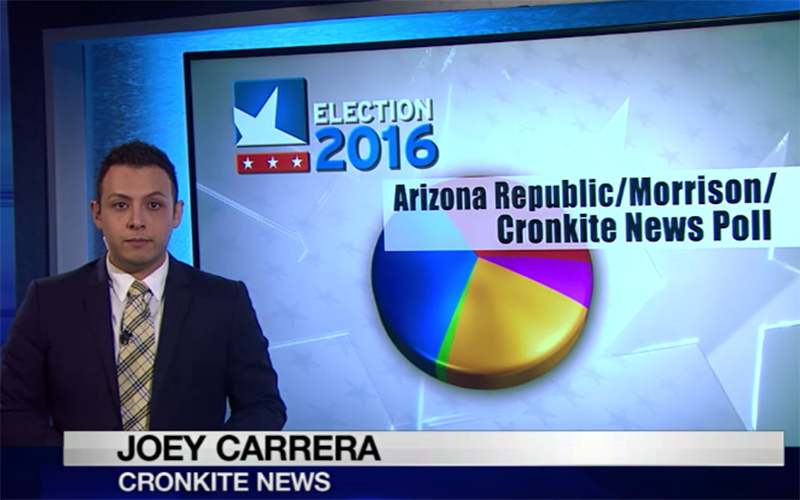Donald Trump and Hillary Clinton are neck and neck in the presidential race in Arizona with more than 20 percent of the state’s likely voters undecided, according to an Arizona Republic/Morrison/Cronkite News Poll.
In the statewide poll of 704 likely voters, 35.1 percent said they supported Clinton while 33.5 percent said they supported Trump. With a margin of error plus or minus 3.3 percentage points, the race is a statistical dead heat with 22.9 percent of respondents saying they haven’t decided. Libertarian nominee Gary Johnson had 6.9 percent support while Green Party candidate Jill Stein had 1.5 percent.
“We are in uncharted territory with this presidential election,” said Douglas Cole, the senior vice president of HighGround Public Affairs Consultants, a political strategy firm based in Phoenix. “For the first time in our country’s history, we have two candidates that have extremely high negatives and the conversation becomes in this presidential campaign about who’s the less of the perceived evil.”
The Morrison Institute for Public Policy contracted with Behavior Research Center to conduct the poll from Aug. 17 to 31. Using up-to-date voter registration lists, almost 1,700 live landline and cellphone calls were used to obtain an average of 800 valid responses from likely voters per question. The interviews were performed in English or Spanish. The margin of error fluctuates by question between plus or minus 3 to 4 percentage points.
The poll also includes approval ratings for several state officials. Out of 784 respondents, 44.4 percent said they found Gov. Doug Ducey as either favorable or very favorable, while 35.6 percent found him to be unfavorable or very unfavorable. Meanwhile, 48.8 percent said they found Republican Sen. John McCain – currently embroiled in a fight for reelection – favorable or very favorable. Sen. Jeff Flake did not fare as well: 34.9 percent said they had a favorable or very favorable opinion of him. In Maricopa County, out of 468 people, 38.2 said they found Sheriff Joe Arpaio to be favorable or very favorable, 57.3 percent said they found Arpaio unfavorable or very unfavorable.
50 percent favor marijuana initiative
The poll also gauged opinion on ballot initiatives and immigration issues, including whether the U.S. should build a wall on the U.S.-Mexico border. Fifty percent of poll respondents said they supported the legalization of recreational marijuana for adults over 21 years old, while 39.9 percent said they were against and 10.2 said they didn’t know.
On the proposal to raise the state’s minimum wage from $8.05 per hour to $10 per hour in 2017 and then to $12 by 2020, 61.3 percent were in favor, 31 percent were opposed and 7.7 percent undecided.
Poll respondents were not in favor of deporting all illegal immigrants currently in the United States, with 68.1 disagreeing or strongly disagreeing and only 24.7 agreeing or strongly agreeing. And on the question of building a wall along the border – a cornerstone of Trump’s campaign – 54.6 say the wall “should maybe not” or “should definitely not” be built, while 33.4 favored building a wall. About 12 percent said they were unsure.
Arizona’s GOP history
Since Harry Truman carried Arizona in 1948, Bill Clinton is the only Democrat to win the state when he was re-elected in 1996. Trump has made four campaign stops in the state, including unveiling his immigration plan last week in Phoenix. He has gained support of several top-ranking Republicans, including Gov. Doug Ducey, former Gov. Jan Brewer and Maricopa County Sheriff Joe Arpaio. Republican Sen. John McCain said he will “support the party’s nominee,” but GOP Sen. Jeff Flake has been an outspoken critic of Trump.

Donald Trump speaks on his immigration policy at the Phoenix Convention Center August 31. (Photo by Katie Bieri/Cronkite News)
But Tim Sifert, a spokesman for the Arizona Republican Party, said in reaction to the poll numbers that rumors of Arizona as a swing state are common.
“It’s like a broken record we hear that every election,” he said, adding that Republicans usually have an advantage when it comes to voter turnout in the state.
Mario Diaz, president of Mario E. Diaz & Associates, a public affairs firm and a Democratic political strategist, said “this is a dream election for Democrats, especially for Secretary Clinton. In Arizona, if Democrats can keep a statewide election within the margin of error, there is a significant opportunity for a Democrat to win.”
Clinton visited Arizona in March, along with President Clinton. She has just opened offices in Phoenix and Tucson in an effort to ramp up grassroots campaigning in the state, according to the Arizona Republic.

Hillary Clinton speaks during a campaign rally on Monday, March 21, 2016, at Carl Hayden High School in Phoenix. Clinton spoke on a wide range of topics and displayed a broad range of support from prominent Arizona Democrats. (Ben Moffat/Cronkite News)
“This is a traditionally Republican state, but Hillary’s not taking anything for granted,” Luis Heredia, a Democratic National Committeeman based in Arizona, said. Adding, “The Arizona Democratic party has built the strongest ground game we’ve seen in history and we will continue to register voters, contact voters–get them engaged so they are voting early.”
Convincing undecideds
Trump’s support comes from self-identified Republicans (73 percent) and Independents (24.4 percent), while Clinton has support from 78.6 percent of Democrats and 26.7 percent of Independents. Of those who said they have not decided, 19.1 percent identified as Republican, 18.9 percent as Democrat and 30 percent as Independent. As with the national poll numbers, Trump holds the edge over Clinton with voters who have not earned a college degree while she leads in those who have a bachelor’s or higher. Trump holds a 5.2 percentage point lead with men while Clinton holds an 8.1 percentage point lead among women in the state. More than 20 percent of men and women respondents were undecided.
Share your perspective:
Heredia said Democrats will try to persuade undecided voters through more positive messaging from Clinton.
“If you even disagree with her, I think she is pragmatic enough to lead our country forward and really try to solve problems,” he said. “I think what you see from Donald Trump is blame and that’s not necessarily a solution.”
Sifert said the GOP is working to grab more millennials by November, with 19 different field offices throughout the state with phone banks.
“They’re calling a lot of the undecided voters to talk to them, persuade them, find out what they’re interested in and lobby on behalf of our candidates and our Republican slate,” he said. “It’s a really effective way to get involved.”
Both candidates have high unfavorable ratings. Trump is considered very unfavorable or unfavorable by 60 percent of 784 people polled and 59 percent said they thought Clinton to be unfavorable or very unfavorable.
Thom Reilly, the director of The Morrison Institute for Public Policy, the organization that conducted the poll, said that with nearly a quarter of undecided voters, these numbers could have big implications for the remaining months of the election.
“It could indicate that Arizona’s in play,” he said.

